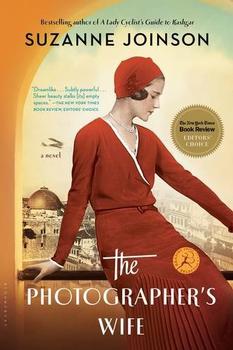Summary | Excerpt | Reading Guide | Reviews | Beyond the Book | Readalikes | Genres & Themes | Author Bio

Jerusalem, 1920
The man opposite Prue was trying to force a canary through the train window and such a hash he made of it: a yellow fluttering blur, bright black accusatory eyes, and then – pouf – gone. The empty birdcage on the table in front of him was a perfect dome with a wooden swing in its middle suspended for a bird to rock and pretend to fly. She longed to touch it, but didn't dare.
He hadn't remotely noticed her, despite the fact that they were the only two Europeans on the train. Most passengers appeared to be Armenian, Egyptian, Jerusalemites and others Prue couldn't easily identify. She watched him steadily, hoping he would look over at her, but he never did. His cheeks were awfully red and he was sweating despite the cold; she guessed he was English. A framed picture on the back of the train door stated RAPID AND COMFORTABLE TRAVELLING FACILITIES TO ALL PARTS OF PALESTINE with connections to EGYPT, SYRIA, AND BEYOND, wherever BEYOND might be, but the train was not particularly comfortable and had been still for some minutes now. There was no sign of the purser.
The slam of a door could be heard further along the carriage. The air was suspended, everyone waited.
Prue was travelling alone, despite being just eleven years old. Her father had given her permission to visit a village called Yibna for the day to photograph a Mamluk tower. It had gone well, all things considered. She was intact, not murdered. Not a person had spoken to her. Bandits had not stolen her much-cherished camera, a Kodak Eastman. True, she had been unprepared for a flurry of snow that left her damp and cold, but now she was returning to Jerusalem full of hope that it would be friendlier, warmer.
She could see from the luggage tag dangling from the suitcase in the rack above that the man had travelled from Cairo, via Alexandria and Kantara. The handwriting was clear, very black, and looking at it Prue realised who he must be. She had over-heard him saying to the purser earlier that he was going to Jerusalem. He must surely be the new pilot, then. Eleanora's great friend. There were no other Englishmen on the train, and he was due about now. She tried again at getting his eye, but he avoided hers, and the loneliness which had lifted for an instant resettled on her, like dusk.
She looked out of the window. Steam from the train's engine dispersed to reveal a stretch of stony ground, the suggestion of hills in the far off, a pure, blank sky. Prue was still not used to the lack of grass. She missed hawthorn blossom and damp tree bark and ladybirds and the hairy strength of daisy stalks so much that she was sickened by the memory of these things. Might she ask him? Hello, sir, are you the man my father has employed to fly aircraft over Jerusalem? Just as she was about to speak the man jumped back in his seat.
'Good heavens,' he said. A face was pressed against the train window, a bottom lip dragging along the glass, revealing gums, teeth, and then just as quickly it was gone, dropped down presumably towards the tracks, and all that remained was a streak of spit on the window. Nothing happened for a moment. The man, who might or might not be Eleanora's friend, put his finger on the glass near the smear, and then, in a surge, all the passengers in the carriage rushed over to that side of the train to see what was happening. Prue did the same, and found herself between the Englishman's elbow and the cane of an Armenian clergyman.
Outside, soldiers in a strange uniform were in a circle around a man on the ground and great boots were kicking deep into his stomach. His head was twisted towards the train and Prue saw his tongue shoot in and out of his mouth each time a foot touched him. The Armenian clergyman, disregarding Prue, pointed his cane at the Englishman.
Excerpted from The Photographer's Wife by Suzanne Joinson. Copyright © 2016 by Suzanne Joinson. Excerpted by permission of Bloomsbury USA. All rights reserved. No part of this excerpt may be reproduced or reprinted without permission in writing from the publisher.
Your guide toexceptional books
BookBrowse seeks out and recommends the best in contemporary fiction and nonfiction—books that not only engage and entertain but also deepen our understanding of ourselves and the world around us.